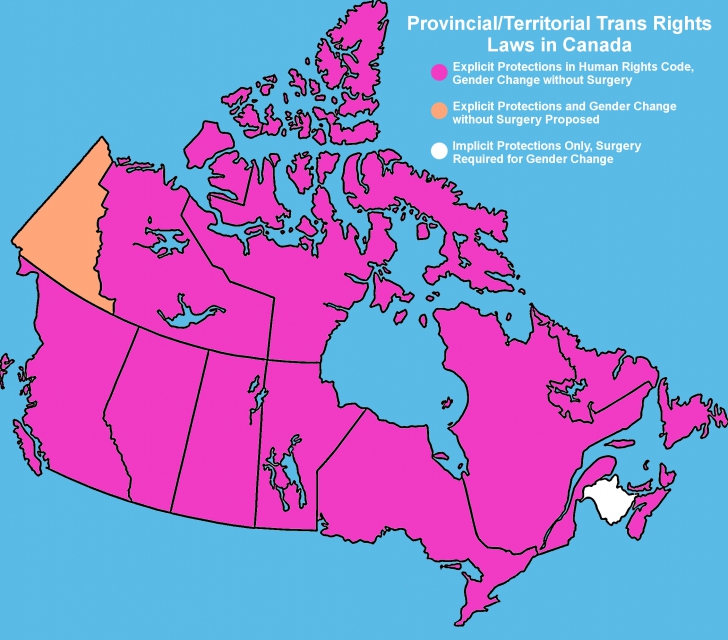Trans activists in Yukon are cautiously optimistic after the territory’s Liberal government announced it was beginning consultations on amendments to Yukon’s Human Rights Act and Vital Statistics Act to be more inclusive of trans people.
The new government was elected in November 2016, and had promised in its campaign materials to review all legislation to ensure it is compliant with LGBT rights.
At this point, draft bills have not been tabled. The government is simply seeking input on proposals and asking the people for feedback through an online questionnaire.
The government is proposing to add “gender identity” and “gender expression” to the list of prohibited grounds for discrimination under the Yukon Human Rights Act.
All other provinces and territories in Canada except New Brunswick currently list one or both of those as prohibited grounds for discrimination under their human rights acts. Nunavut was the most recent territory to add the protections on March 13, 2017.
Currently, the Yukon Human Rights Commission considers protections for trans people to be implied under the prohibited ground of “sex,” as does the New Brunswick Human Rights Commission.
It’s the proposed changes to the Vital Statistics Act that are causing some trans people concern.
The changes would allow those with Yukon birth certificates to change their legally registered gender without having to undergo gender confirming surgery. Again, every other province and territory but New Brunswick has made this change, although the procedures to change one’s legal gender vary from province to province.

Among the proposals for discussion are different procedures for adults and children (defined as being under 19 years old). While adults would only require a letter of support from anyone who has known the person for at least two years, children would require consent of all custodial parents, a letter from someone who’s known the child for two years and a letter of support from a professional. In the absence of support from the parents, children could apply on their own with a court order.
Chase Blodgett, an organizer with All Genders Yukon, welcomes the simple process but says that the requirements are still unnecessary and burdensome, especially in cases where a trans child’s relationship with one or both parents is strained.
“There’s situations where parents are going through divorces, and there’s lots of cases where one parent is transphobic and doesn’t support the child, and the other parent does,” Blodgett says.
Although trans youth would have the option of seeking a court order, there are barriers to accessing the court and getting the required documents, he says.
“We have some of those kids in our community. I support kids like that. I’m worried about them,” Blodgett says. “To get a court order, that’s a day off work or a day off school. There’s a lot of challenges to accessing a court order.”
Blodgett says he’d rather the law allow trans people of all ages to simply self-declare that they’d like to change their gender.
“Why do you need someone who’s known you two years to verify? Cisgengder people don’t have to have anyone verify that, so why should trans or two-spirit or non-binary people have to verify that?” he says.
The government is also proposing an “X” marker for those who choose to have their gender “unspecified,” and a separate marker that they do not describe for babies that are born intersex.
While Blodgett says this is an improvement, he would prefer the government not collect gender information at all, and not display it on ID documents.
Complaints about the use of gender data on birth certificates have been filed with human rights commissions in British Columbia and Saskatchewan. The Canadian federal government recently agreed to review its collection of gender data related to Social Insurance Numbers, and is considering gender markers on passports.
The government of Ontario recently announced plans to remove gender markers from OHIP cards and to include an “X” option on driver’s licences.
Gender markers on birth certificates are more complicated, because all other ID markers are based on them, and changes may have cross-jurisdictional impacts, for example, when applying for a passport or when boarding a flight.
Driver’s licences in Yukon did not have gender markers on them until 2011, after the federal government made changes to the Identity Screening Regulations used in airports, requiring airlines confirm that travellers’ gender presentation matches their ID. Blodgett says he’s since been denied access to flights because his gender presentation and documents do not match.
While he appreciates that the government is providing an option for non-binary people, he says the “X” is unnecessary and stigmatizing.
“If you could get an ‘X,’ a trans person, an intersex person, a non-binary person, a cis woman, then what’s the point of having a gender on there? It doesn’t tell you anything, so just take it off,” he says.
“I find it offensive, ‘X’-unspecified. I know my gender, it’s trans or trans-masculine. Why do I have to put an unspecified ‘X’? I’m proud to be trans. Why can’t I put a ‘T’? Why can’t we all have things that accurately reflect who we are?”


 Why you can trust Xtra
Why you can trust Xtra


